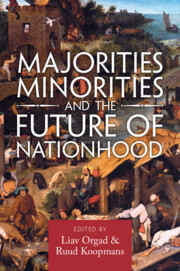Book contents
- Majorities, Minorities, and the Future of Nationhood
- Majorities, Minorities, and the Future of Nationhood
- Copyright page
- Contents
- Figures
- Tables
- Contributors
- Preface
- Acknowledgments
- A Note on the Cover
- 1 Majority–Minority Constellations
- 2 Are There Any Cultural Majority Rights?
- 3 Identity Not Culture
- 4 Nationhood, Multiculturalism, and the Ethics of Membership
- 5 Reconciling the Cultural Claims of Majorities and Minorities
- 6 Linking Minority Rights and Majority Attitudes
- 7 The Liberalism of Fear
- 8 Multiculturalism without Privileging Liberalism
- 9 Why Every Nation Should Nurture (a Thick and Inclusive) Nationalism
- 10 Populism and Cultural Majority Rights
- 11 Legitimate Populism and Liberal Overreach
- 12 The Causes of Populism and the Problem of Cultural Majority Rights
- Index
- References
1 - Majority–Minority Constellations
Toward a Group-Differentiated Approach
Published online by Cambridge University Press: 12 November 2022
- Majorities, Minorities, and the Future of Nationhood
- Majorities, Minorities, and the Future of Nationhood
- Copyright page
- Contents
- Figures
- Tables
- Contributors
- Preface
- Acknowledgments
- A Note on the Cover
- 1 Majority–Minority Constellations
- 2 Are There Any Cultural Majority Rights?
- 3 Identity Not Culture
- 4 Nationhood, Multiculturalism, and the Ethics of Membership
- 5 Reconciling the Cultural Claims of Majorities and Minorities
- 6 Linking Minority Rights and Majority Attitudes
- 7 The Liberalism of Fear
- 8 Multiculturalism without Privileging Liberalism
- 9 Why Every Nation Should Nurture (a Thick and Inclusive) Nationalism
- 10 Populism and Cultural Majority Rights
- 11 Legitimate Populism and Liberal Overreach
- 12 The Causes of Populism and the Problem of Cultural Majority Rights
- Index
- References
Summary
Koopmans and Orgad argue that multiculturalism has taken a life of its own, swinging too far in one direction. The authors assert that the rapidly changing reality calls for a new majority–minority theory and argue that the moral justifications for cultural minority rights should also apply to majority groups. They present two areas in which majorities may become culturally vulnerable and need legal protection: immigration control and domestic affairs. The core of the argument is rooted in a unique framework to address majority–minority constellations. This “intergroup differentiation approach” distinguishes between “homeland majorities” and “migratory majorities,” alongside the traditional distinction of indigenous/national and migratory minorities. In doing so, they criticize the tendency in the multiculturalism literature to gloss over differences between the Anglo-Saxon classical immigration countries, where majorities are of migratory origin, and the countries of the Old World, where new minorities of immigrant origin face indigenous majorities. Koopmans and Orgad provide practical examples for the implementation of their approach and explain the different meanings of cultural majority rights. Only by a contextualized and relational consideration of groups, they conclude, can competing demands of majorities and minorities be fairly evaluated.
Keywords
- Type
- Chapter
- Information
- Majorities, Minorities, and the Future of Nationhood , pp. 1 - 34Publisher: Cambridge University PressPrint publication year: 2022



